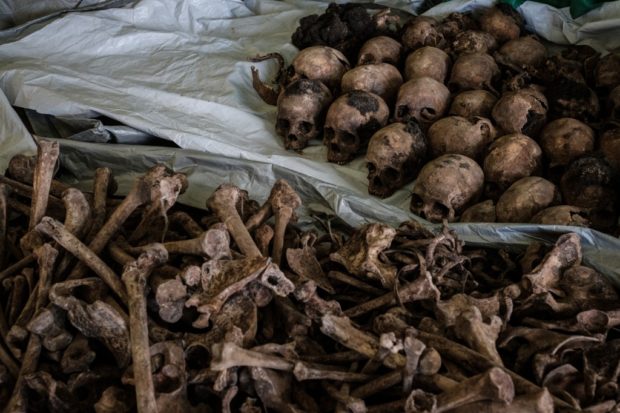Macron to be given report over French role in Rwanda genocide

(FILES) This file photo taken on April 30, 2018 shows collected victims’ bones and skulls from a newly discovered pit which was used as mass grave during 1994 Rwandan genocide and hidden under a house at the local administration office in Kabuga, the outskirts of Kigali, Rwanda. (Photo by Yasuyoshi CHIBA / AFP)
PARIS — A commission of historians will after two years work on Friday submit to President Emmanuel Macron a potentially explosive report scrutinizing the role played by France over Rwanda’s 1994 genocide, sources said.
Two sources aware of its publication, who asked not to be named, told AFP it would be handed over to Macron in the afternoon.
There have long been claims that France, then ruled by President Francois Mitterrand, did not do enough to halt the massacres that left at least 800,000 people dead, mainly among the Tutsi ethnic minority, and was even complicit in the crimes.
The issue still poisons modern relations a quarter of a century on between France and Rwanda under controversial President Paul Kagame, a Tutsi who has ruled the mountainous nation in east Africa’s great lakes region since the aftermath of the genocide.
Macron ordered the setting up of the commission in May 2019 to analyse France’s role in Rwanda from 1990-1994 through archival research.
Article continues after this advertisementFrance notably led Operation Turquoise, a military-humanitarian intervention launched by Paris under a UN mandate between June and August 1994. Its critics believe that it was in reality aimed at supporting the genocidal Hutu government.
Article continues after this advertisementAccess to archives
The 15-member commission, led by historian Vincent Duclert, does not have any specialist on Rwanda, a move the Elysee argues was necessary to ensure complete neutrality.
But the historians — who include experts on the Holocaust, the massacres of Armenians in World War II and international criminal law — have been given access to archives including those of Mitterrand himself — long closed off to researchers.
They have also examined documents of former right-wing premier Edouard Balladur, who at the time was working in a so-called “cohabitation” with the Socialist Mitterrand, as well as archives from the foreign ministry, defence ministry and foreign intelligence service (DGSE).
Duclert himself went to Rwanda in February 2020 but there have been worries over the independence of the commission, notably because it has been working out of the defense ministry in Paris.
While he seeks to position France as an assertive player on the modern world stage, Macron has taken tentative steps to come to terms with once taboo aspects of the country’s historical record, although many would like to see far bolder steps.
Historian Benjamin Stora, tasked with examining France’s actions during Algeria’s war of independence, called for a “truth commission” in his report but Macron ruled out an official apology for abuses.
The contents of the Rwanda report are likely to have a major bearing on future relations between France and Rwanda, which Macron has said he wants to visit later this year.